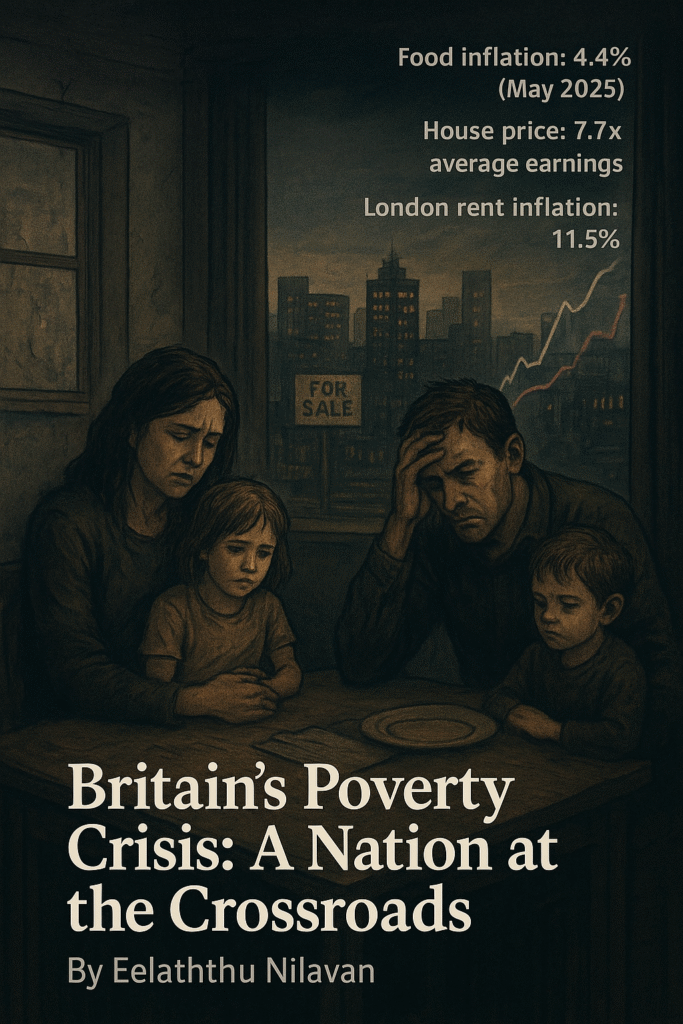Britain is at a breaking point. More than 14 million people — around one in every five citizens — now live in poverty. What makes this crisis especially alarming is that most of these households are not jobless; they are working families. The very idea that employment protects against hardship has collapsed. Wages have not kept up with soaring prices, housing has become unaffordable, childcare drains incomes, and insecure work denies families stability. Unless urgent action is taken, the UK’s middle class risks being hollowed out beyond repair, leaving society dangerously divided between a wealthy elite and millions struggling to survive.

✦. The Scale of the Crisis
The latest data is stark. According to the Joseph Rowntree Foundation, 14.3 million people were living in poverty in 2022/23. Of these:
◉ 8.1 million are working-age adults
◉ 4.3 million are children
◉ 1.9 million are pensioners
Child poverty is particularly severe. After housing costs, 30% of children — about 4.5 million — grow up in households with incomes below 60% of the national median. Even more worrying, around 6 million people are in very deep poverty, meaning they live far below the poverty line.
The crisis cuts unevenly across society. More than half of Bangladeshi and Pakistani households live in poverty. Families with three or more children face poverty rates of about 44–45%, and households where someone is disabled also face much higher risks. Renters are hit hardest: once housing costs are factored in, poverty rates climb steeply.
Most striking of all, the majority of poor children live in households where at least one adult is working. In-work poverty is no longer the exception — it is becoming the norm.
✦. Why Poverty Has Deepened
This surge in hardship is not the result of one cause but of multiple, overlapping forces.
❖.Stagnant Wages and Rising Costs
For over a decade, wages in Britain have barely grown once inflation is considered. When the cost-of-living crisis hit in 2022–23, energy bills and food prices soared, wiping out any modest pay increases. Families found themselves poorer despite working the same or even longer hours.
❖.Housing Pressures
Housing is perhaps the sharpest driver of poverty. Rent in many parts of the country now consumes half a family’s income. Homeownership has become a fading dream for younger generations, while social housing shortages have forced millions into the volatile private rental sector, where insecurity and high costs dominate.
❖.Childcare Costs
Britain has some of the highest childcare costs in Europe. For many parents, particularly women, going to work makes little financial sense once childcare is paid for. Families who want to earn more find themselves blocked by fees that devour their wages.
❖.Insecure Work
Millions are trapped in jobs that offer no stability: zero-hours contracts, gig work, agency jobs, or part-time shifts that fluctuate unpredictably. Without a consistent income, planning for bills or the future is impossible. Work no longer guarantees security; it guarantees exhaustion without reward.
❖.Government Policy and Welfare Cuts
Over the past decade, welfare support has been steadily eroded. The two-child benefit limit penalises larger families. Benefits have often risen more slowly than inflation. Universal Credit has brought complexity and delays, pushing people into debt. Austerity policies stripped back public services, leaving families without adequate safety nets.
❖.Brexit and External Shocks
Brexit disrupted trade and labour supply, raising costs across multiple sectors. Added to global shocks such as the war in Ukraine and the energy crisis, households faced higher bills and fewer protections.
✦.The Human Toll
Statistics tell one story, but the lived reality is harsher. Families are skipping meals so children can eat. Parents are working multiple jobs and are still unable to save for emergencies. Children are falling behind at school because they are tired, hungry, or living in overcrowded housing. Elderly people are forced to choose between heating and food.
The mental strain is immense. Financial insecurity drives anxiety, depression, and ill health. Social divides deepen as some regions — particularly London, the West Midlands, and parts of the North — experience much higher poverty than others. For many, the belief that Britain offers opportunity has faded into distrust and despair.
✦. Why This Moment Is Critical
Britain has faced poverty before, but today’s crisis threatens something deeper: the erosion of the middle class itself. The very people who once felt secure — nurses, teachers, skilled tradespeople — are now slipping into precarity. If hard work no longer provides stability, the entire social contract breaks down.
The middle class has long acted as a stabilising buffer between rich and poor. If it disappears, Britain risks a permanent divide between concentrated wealth and widespread poverty. That path leads to political instability, resentment, and the rise of extremism.
✦. What Must Change
Reversing Britain’s poverty crisis requires bold action, not piecemeal fixes.
◉ Raise Wages and Secure Work: The National Living Wage must be tied to real costs, not political convenience. Insecure contracts should be curbed, and fair pay enforced.
◉ Tackle Housing Costs: Build more social housing, regulate rents, and make housing benefits reflect actual rents. Without affordable housing, poverty cannot be solved.
◉ Make Childcare Affordable: Universal childcare for young children would allow parents to work without losing most of their income and would invest in the next generation.
◉ Rebuild Welfare: Scrap punitive measures like the two-child limit. Ensure benefits rise with inflation and are paid promptly. Welfare should protect people, not punish them.
◉ Protect Vulnerable Groups: Provide targeted support for families with disabilities, single parents, and ethnic minority households disproportionately affected by poverty.
◉ Stabilise Costs of Essentials: Energy, food, and transport must be shielded from extreme price volatility. Britain needs long-term strategies for resilience in these basic areas.
✦. The Cost of Inaction
If Britain fails to act, poverty will deepen, inequality will harden, and the middle class will shrink into irrelevance. Children born into hardship today may grow up with fewer opportunities than their parents, reversing centuries of progress. Public services will face unbearable pressure. Social trust will fray.
Yet the crisis can still be reversed. Britain has the resources and the capacity to build a fairer society. What is required is political courage: a willingness to put dignity, stability, and opportunity ahead of austerity and short-term politics.
✦. Conclusion:
The poverty crisis is not inevitable. It is the result of choices — about wages, welfare, housing, and priorities. Britain now faces another choice: continue down the path of division, or take bold steps to restore fairness and stability.
Work should provide security. Families should be able to raise children without hunger or fear. The middle class should not be a memory. This is not only a question of economics but of justice — the kind of society Britain wants to be.
If the right choices are made now, Britain can still reclaim its promise. If not, history may remember this era as the moment poverty became normalised, and hope disappeared from the lives of millions.

Written by Eelaththu Nilavan
UK & Global Economic Analyst | Specialist in Financial, Political & Market Trends
13/09/2025




1 thought on “Britain’s Poverty Crisis: A Nation at the Crossroads”